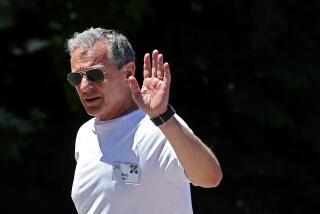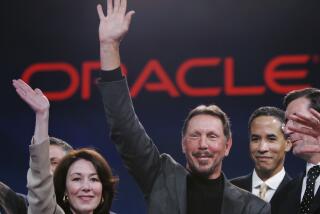Another Morgan Stanley Exec Joins Wave of Exits
There was more fallout from Morgan Stanley’s management shake-up Wednesday, as the investment bank’s global head of institutional equity trading resigned, joining a number of other high-ranking executives who have walked out.
A Morgan Stanley spokeswoman confirmed the departure of Guru Ramakrishnan. His decision to leave came a day after the resignations of his boss, John P. Havens, the head of the Institutional Equity Division, and Vikram S. Pandit, president and chief operating officer of its Institutional Securities Group.
The wave of exits follows Chief Executive Philip Purcell’s decision to replace President Stephan Newhouse with two co-presidents, Morgan Stanley veterans Stephen Crawford and Zoe Cruz.
The firm’s former chairman and former president are calling for the ouster of Purcell himself, saying the shake-up he engineered was not in the best interest of the company.
Perhaps to help reassure Wall Street, the company promoted one of its foremost investment bankers, Joseph Perella, to vice chairman; he will report directly to Purcell. Perella, a highly regarded deal maker, most recently served as chairman of Morgan Stanley’s Institutional Securities Group. He has also been a leading member of a small group of senior bankers that focused on the firm’s most high-profile transactions. The details of his new role were not clear.
In a statement Tuesday, Morgan Stanley said Crawford and Cruz would help provide new oversight of the company’s institutional securities and investment management operations.
However, a group of former executives and major shareholders, led by former Chairman Parker Gilbert and former President Robert Scott, warned that the restructuring could result in the loss of other executives.
The group also released a letter, dated March 3, sent to Morgan Stanley’s board calling for Purcell’s departure. The group blamed Purcell for the company’s lagging stock price and financial performance.
“We believe that the overriding cause of the firm’s poor performance is a failure of leadership by Philip Purcell as the firm’s CEO,” the March 3 letter said.
Purcell came to Morgan Stanley, a firm that catered to elite clients, when it merged in 1997 with the more down-market Dean Witter Discover & Co. Purcell won the CEO’s job after the merger.
The Wall Street Journal said Wednesday that Purcell was disappointed by the actions of the former Morgan Stanley executives.
“It is horrible governance for guys gone 10 years to do this and set themselves up as a new board of directors,” he told the newspaper in an interview Tuesday.
He told the Journal he had the full support of Morgan Stanley’s board of directors and added, “We are pursuing the right strategy.”
When executive ranks are rattled like this, it often signals a planned change in culture or strategy, said Jim Drury, founder of James Drury Partners, an executive search consulting firm that specializes in recruiting board directors and CEOs. If that is what’s going on, it’s almost inevitable that some members of the old team will no longer fit.
Drury, who described Purcell as “one of the smartest CEOs walking in America,” said he was confident Morgan Stanley’s board would take any action necessary.
“This is a board that has a great deal of weight on it ... if you take each person and look at the substance of their individual careers,” Drury said. “There are people on that board who wouldn’t hesitate to say, ‘Phil, what the heck are you doing?’ ”
Regardless of what happens next, in order to restore stability at the firm, Purcell and the board should be prepared to communicate clearly with employees, managers and shareholders about what lies ahead, Drury said.
The firm’s shares rose $1.67, to $55.28, on the New York Stock Exchange.
More to Read
Inside the business of entertainment
The Wide Shot brings you news, analysis and insights on everything from streaming wars to production — and what it all means for the future.
You may occasionally receive promotional content from the Los Angeles Times.










